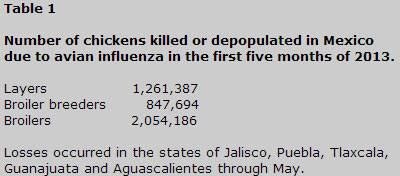
The total economic impact of the H7N3 highly pathogenic avian influenza outbreak in Mexico in 2012 was approximately $750 million, said Sergio Chavez, executive president, Unión Nacional de Avicultores, speaking at the USA Poultry & Egg Export Council meeting in Williamsburg, Va. The industry lost or euthanized approximately 24 million birds; most of these birds were table egg layers or replacement pullets.
In 2013, just over 1.25 million table egg layers have been lost, which Chavez said represents less than 2 percent of the country’s total egg layer flock (see Table 1). The loss of over 800,000 broiler breeders, about 8 percent of the country’s total broiler breeder flock, has resulted in a shortage of fertile hatching eggs and will result in a decline in chicken meat production. An increased number of broiler hatching eggs has been imported from the United States to replace some of the shortfall, but it hasn’t been enough to prevent a shortage of chicken meat.
Chicken meat imports
Producer live chicken prices have increased from approximately $20 per kilogram early in 2012 to a peak of approximately $30 per kilogram in May of this year. In response to the high prices for chickens, on May 15, 2013, the Mexican government waived tariffs on up to 300,000 tons of chicken imports from countries that don’t have free trade agreements with Mexico. Processors in Argentina and Brazil have asked to be inspected and certified for export to Mexico. At this time, none of them have been certified.
The amount of chicken meat, excluding mechanically separated chicken, that has been imported into Mexico has increased substantially as a result of the influenza outbreak (see Table 2). In the first five months of 2013, more chicken has been imported than is typically imported in an entire year. Table egg imports into Mexico, while lower in total volume than chicken meat imports, have increased by a much greater percentage. The producer price for table eggs in Mexico was approximately $11 per kilogram in June of 2012, just before the avian influenza outbreak was recognized, according to Chavez. The producer price for eggs peaked at $26 per kilogram in May of 2013.
In addition to depopulation, vaccination has been used as a means of controlling the influenza outbreak. Chavez reported that through May 2013, 440 million doses of the vaccine developed for this outbreak had been distributed. He said that the vaccine is primarily being used on table egg layers, pullets and broiler breeders.


















